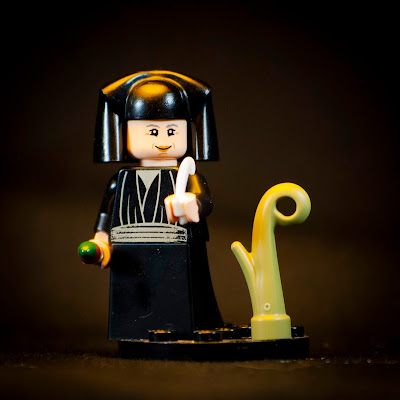St. Isidore of Seville
There's a song in Just Dance called Isidora that is going to be in my head for the next 24 hours after writing this.
In a world where the coronavirus has pushed many of our livelihoods and even social lives entirely onto the internet, Isidore of Seville, the patron saint of the internet, is a particularly appropriate intercessor for us to turn to.
Isidore's parents were doing something right, because every child they raised ended up canonized as a saint. Isidore's brothers St. Leander of Seville and St. Fulgentius of Cartagena, and his sister St. Florentina of Caragena all join him among the Roman (and Eastern Orthodox) canon.
As with St. Nicholas and St. Anthony the Great, St. Isidore was involved in combating the Arian heresy. I'm not sure there's any other movement in history that produced as many saints.
However, what Isidore is known for, and the reason for his unique patronage, was his high regard for scholarship, logic, and the gathering together of knowledge. In fact, his first book was an attempt to gather together a summation of all human knowledge -- truly a daunting task, even 1400 years ago. Some of the writing that he collected in this encyclopedia is known to us today only because of this work, known as the Etymologiae or the Origines. It would be used as a textbook in schools for the next nine centuries.
Isidore was alive just after the fall of the Roman empire, and witnessed much of the world rapidly losing literacy and destroying books as suspected magic. Isidore himself, therefore, saw the importance of maintaining the knowledge that the Roman empire had collected.
When he become bishop of Seville, Isidore ensured that those in his See were able to receive an education, and maintained the teachings of Aristotle and other Roman philosophers, who were quickly becoming obscure elsewhere in the former Roman territory. He formed schools and funded monasteries to this end, and even helped to pass a decree that all the other Sees in the area would establish similar schools.
Isidore didn't pursue education for its own sake, though. He viewed the pursuit of truth as a path to God, and argued passionately about the importance of truth, especially in religion. He was so great at this debate that he nearly eradicated Arianism in his own See, including converting the Visigothic kings who ruled over the area.
In addition to his Etymologiae, Isidore wrote over a dozen books on topics ranging from philosophy to astronomy to theology to history.
Isidore is often called "The last scholar of the ancient world".
In a world where the coronavirus has pushed many of our livelihoods and even social lives entirely onto the internet, Isidore of Seville, the patron saint of the internet, is a particularly appropriate intercessor for us to turn to.
Lifetime: 560 to 636
Region: Seville, Spain
Patronages: The internet; Students; Programmers
Iconograpy: Crosier and miter; Book; Bees
Feast Day: April 4
Region: Seville, Spain
Patronages: The internet; Students; Programmers
Iconograpy: Crosier and miter; Book; Bees
Feast Day: April 4
Isidore's parents were doing something right, because every child they raised ended up canonized as a saint. Isidore's brothers St. Leander of Seville and St. Fulgentius of Cartagena, and his sister St. Florentina of Caragena all join him among the Roman (and Eastern Orthodox) canon.
As with St. Nicholas and St. Anthony the Great, St. Isidore was involved in combating the Arian heresy. I'm not sure there's any other movement in history that produced as many saints.
However, what Isidore is known for, and the reason for his unique patronage, was his high regard for scholarship, logic, and the gathering together of knowledge. In fact, his first book was an attempt to gather together a summation of all human knowledge -- truly a daunting task, even 1400 years ago. Some of the writing that he collected in this encyclopedia is known to us today only because of this work, known as the Etymologiae or the Origines. It would be used as a textbook in schools for the next nine centuries.
Isidore was alive just after the fall of the Roman empire, and witnessed much of the world rapidly losing literacy and destroying books as suspected magic. Isidore himself, therefore, saw the importance of maintaining the knowledge that the Roman empire had collected.
When he become bishop of Seville, Isidore ensured that those in his See were able to receive an education, and maintained the teachings of Aristotle and other Roman philosophers, who were quickly becoming obscure elsewhere in the former Roman territory. He formed schools and funded monasteries to this end, and even helped to pass a decree that all the other Sees in the area would establish similar schools.
Isidore didn't pursue education for its own sake, though. He viewed the pursuit of truth as a path to God, and argued passionately about the importance of truth, especially in religion. He was so great at this debate that he nearly eradicated Arianism in his own See, including converting the Visigothic kings who ruled over the area.
“If a person wants to be always in God’s company, they must pray regularly and read regularly. When we pray, we talk to God; when we read, God talks to us.”
In addition to his Etymologiae, Isidore wrote over a dozen books on topics ranging from philosophy to astronomy to theology to history.
Isidore is often called "The last scholar of the ancient world".
Graciously hear the prayers, O Lord,-From the Roman Missal
which we make in commemoration of Saint Isidore,
that your Church may be aided by his intercession,
just as she has been instructed by his heavenly teaching.
Through our Lord Jesus Christ, your Son,
who lives and reigns with you in the unity of the Holy Spirit,
one God, for ever and ever. Amen.






